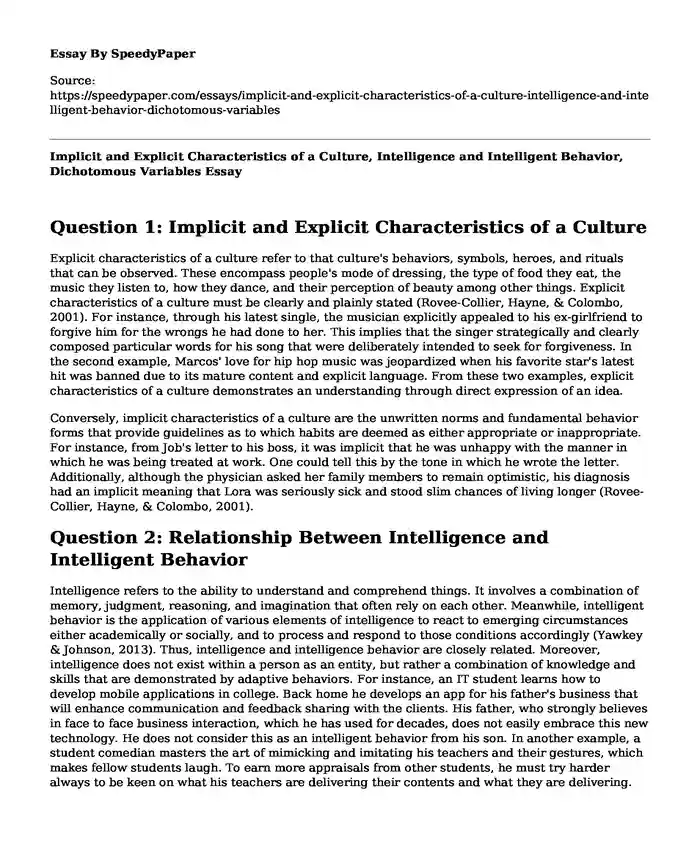
| Type of paper: | Essay |
| Categories: | Culture Human behavior |
| Pages: | 3 |
| Wordcount: | 789 words |
Question 1: Implicit and Explicit Characteristics of a Culture
Explicit characteristics of a culture refer to that culture's behaviors, symbols, heroes, and rituals that can be observed. These encompass people's mode of dressing, the type of food they eat, the music they listen to, how they dance, and their perception of beauty among other things. Explicit characteristics of a culture must be clearly and plainly stated (Rovee-Collier, Hayne, & Colombo, 2001). For instance, through his latest single, the musician explicitly appealed to his ex-girlfriend to forgive him for the wrongs he had done to her. This implies that the singer strategically and clearly composed particular words for his song that were deliberately intended to seek for forgiveness. In the second example, Marcos' love for hip hop music was jeopardized when his favorite star's latest hit was banned due to its mature content and explicit language. From these two examples, explicit characteristics of a culture demonstrates an understanding through direct expression of an idea.
Conversely, implicit characteristics of a culture are the unwritten norms and fundamental behavior forms that provide guidelines as to which habits are deemed as either appropriate or inappropriate. For instance, from Job's letter to his boss, it was implicit that he was unhappy with the manner in which he was being treated at work. One could tell this by the tone in which he wrote the letter. Additionally, although the physician asked her family members to remain optimistic, his diagnosis had an implicit meaning that Lora was seriously sick and stood slim chances of living longer (Rovee-Collier, Hayne, & Colombo, 2001).
Question 2: Relationship Between Intelligence and Intelligent Behavior
Intelligence refers to the ability to understand and comprehend things. It involves a combination of memory, judgment, reasoning, and imagination that often rely on each other. Meanwhile, intelligent behavior is the application of various elements of intelligence to react to emerging circumstances either academically or socially, and to process and respond to those conditions accordingly (Yawkey & Johnson, 2013). Thus, intelligence and intelligence behavior are closely related. Moreover, intelligence does not exist within a person as an entity, but rather a combination of knowledge and skills that are demonstrated by adaptive behaviors. For instance, an IT student learns how to develop mobile applications in college. Back home he develops an app for his father's business that will enhance communication and feedback sharing with the clients. His father, who strongly believes in face to face business interaction, which he has used for decades, does not easily embrace this new technology. He does not consider this as an intelligent behavior from his son. In another example, a student comedian masters the art of mimicking and imitating his teachers and their gestures, which makes fellow students laugh. To earn more appraisals from other students, he must try harder always to be keen on what his teachers are delivering their contents and what they are delivering. As a result, he gets an edge to learn and master more concepts as compared to his classmates. Teachers, who form the majority of his jokes, find this behavior less intelligent while to the student, it is an intelligent behavior that widens the scope of his thinking.
Question 3: Dichotomous Variables
A dichotomous variable is defined as a variable that has exactly two discrete values. The variables are described as categorical because of their two levels or categories. Some of the examples of dichotomous variable include pass or fail, rich or poor, head or tail, democrat or republican, and male or female (Urdan, 2005). Dichotomous variables are simply obtained by counting. For instance, the truck carrying goods from the seaport has 22 tires, the pilot few for 23 hours non-stop to Heathrow Airport. Meanwhile, a continuous variable is defined as a variable whose possible number of values is infinite. This means that any values can qualify to be a variable. When two dichotomous variables are continuous it implies that there exist some possibilities between them. For instance, to pass or to fail an exam is a perfect example of a continuous dichotomous variable. With the grades test ranging from 0 to 100%, there can be every possible percentage anywhere between. A learner can score pass with 74% or fail with 69% (Urdan, 2005). 69.5% can also be a pass depending on the mark set by the teacher. Additionally, the age of a person is a continuous variable. One cannot say that he or she is 40 years old for instance. Age keeps on changing and it could be 40 years, 2 months, 1 week, 3 days, 21 hours, and 32 minutes.
References
Rovee-Collier, C., Hayne, H., & Colombo, M. (2001). The development of implicit and explicit memory. Amsterdam: Benjamins.
Urdan, T. C. (2005). Statistics in Plain English. London: Psychology Press.
Yawkey, T. D., & Johnson, J. E. (2013). Integrative Processes and Socialization: Early to Middle Childhood. London: Psychology Press.
Cite this page
Implicit and Explicit Characteristics of a Culture, Intelligence and Intelligent Behavior, Dichotomous Variables. (2022, Jun 08). Retrieved from https://speedypaper.net/essays/implicit-and-explicit-characteristics-of-a-culture-intelligence-and-intelligent-behavior-dichotomous-variables
Request Removal
If you are the original author of this essay and no longer wish to have it published on the SpeedyPaper website, please click below to request its removal:
- Summary and Discussion Essay Example of Bill McKibben
- White Skin, White Mask - Free Essay with the Article Analysis
- Essay Example: Planning a Graduation Luncheon
- Climate Essay Sample
- Essay Sample on Maternity Case Study
- Essay Sample: Freud and Ahmed Approach to Feelings
- Essay Example: Background of Why the Study Was Done
Popular categories




